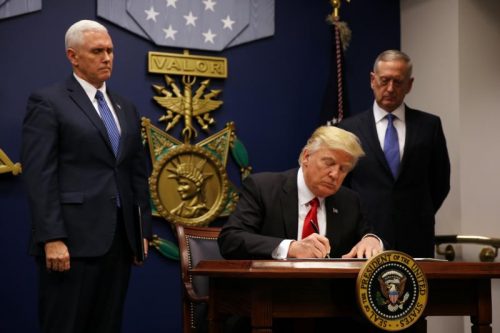WASHINGTON (CNS) — The U.S. Department of Justice issued a brief notice March 17 that it will appeal a Maryland federal judge’s ruling that blocked President Donald Trump’s new executive order on a temporary travel ban.
An appeal of the March 16 decision by U.S. District Judge Theodore Chuang in Maryland sends the case to the U.S. Court of Appeals for the 4th Circuit, which is based in Richmond, Virginia.
A day before Chuang ruled, U.S. District Judge Derrick Watson in Honolulu blocked the revised order, which called for stopping refugee resettlement programs for 120 days and banning citizens of six Muslim-majority countries — Iran, Libya, Somalia, Sudan, Syria and Yemen — from entering the U.S. for 90 days. The new order leaves out Iraq, which was in his first order.
Both judges said the temporary ban, which was to have taken effect at midnight March 16, violated the Establishment Clause of the First Amendment, which says the government can pass no law that establishes religion or prohibits the free exercise of religion.

If the Department of Justice had decided to appeal Watson’s order, the case would have gone to the 9th Circuit, the court that upheld several lower court rulings that blocked Trump’s first executive order.
Catholic Legal Immigration Network Inc., or CLINIC, applauded both judges for blocking implementation of the latest Trump administration travel and refugee policies.
“As both judges said, the March 6 executive order is clearly a religion-based test and it should be stopped,” said Jeanne Atkinson, executive director of CLINIC, which is based in the Washington suburb of Silver Spring, Maryland. “The language of this order may differ somewhat from the earlier version — which was also blocked by several federal courts — but it is no improvement on the core problem with the ban.”
“In the United States, we do not base our laws about who may come here to visit, work or study, let alone who may immigrate, on religious beliefs,” she said in a March 16 statement. “There is too much evidence that animus toward Muslims is at the heart of both versions of these travel bans.”
In their decisions, Watson and Chuang both pointed to anti-Muslim comments made by Trump during his presidential campaign and such comments made by others associated with Trump as evidence that the ban discriminated against a certain religion.
In her statement, Atkinson said: “We stand in solidarity with our Muslim brothers and sisters, who would be affected disproportionately by the ban on travel from six predominantly Muslim countries.”
Omar Jadwat, director of the American Civil Liberties Union’s Immigrants’ Rights Project, said the organization looked forward “to defending this careful and well-reasoned decision in the appeals court.” The ACLU was one of the groups that filed suit against the executive order.
Trump’s temporary travel ban “has fared miserably in the courts, and for good reason — it violates fundamental provisions of our Constitution,” Jadwat added in a statement.
In her statement, Atkinson said Chuang and Watson were “correct to stop such misguided policies.”
“The United States is better than this,” she added.






















